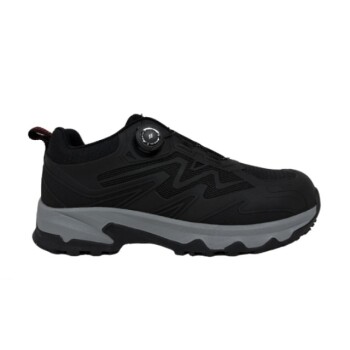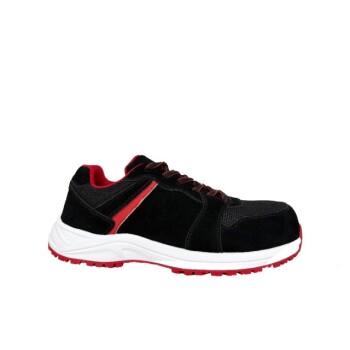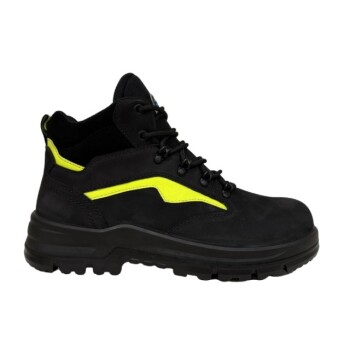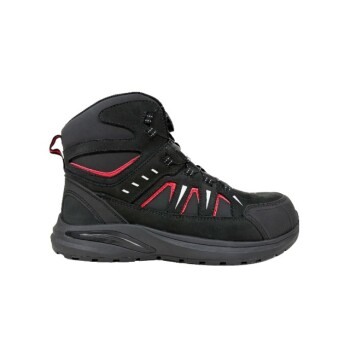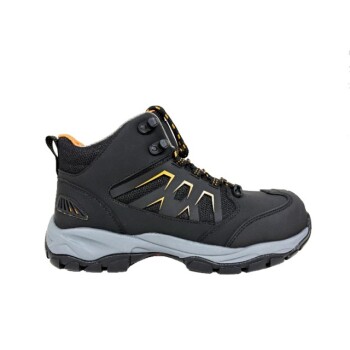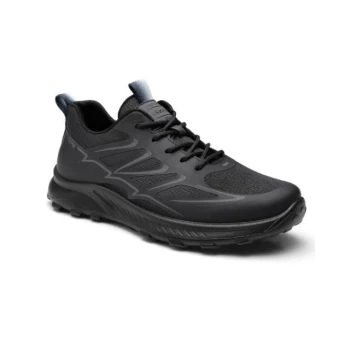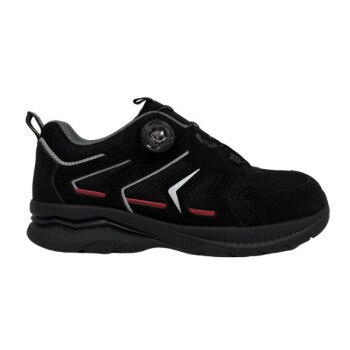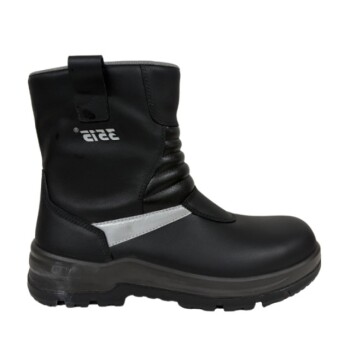At their core, slip-resistant shoes are distinguished from regular shoes by three primary factors: the specialized material of their outsole, the engineered design of their tread pattern, and a more durable, supportive overall construction. Unlike regular footwear designed for general walking, slip-resistant shoes are purpose-built tools designed to maintain grip on hazardous wet or greasy surfaces, making them essential for specific professional environments.
The crucial difference is not a single feature, but a deliberate system of design. A soft rubber outsole, a liquid-channeling tread pattern, and supportive construction work together to actively prevent slips and falls where regular shoes would fail.
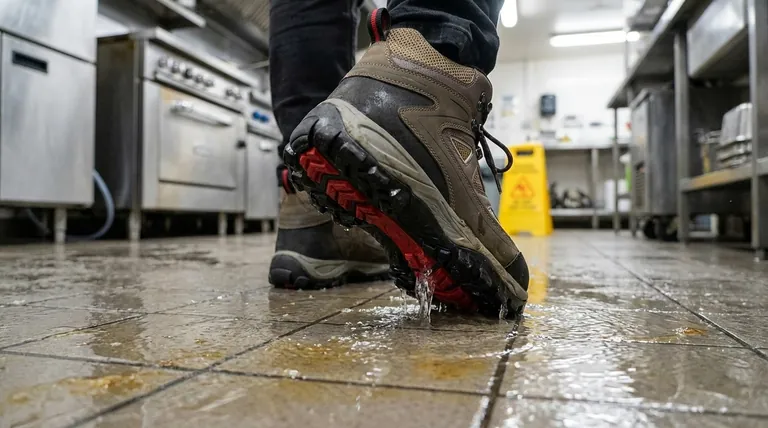
Deconstructing the Outsole: Material and Pattern
The most significant innovations in slip-resistant footwear are found in the outsole—the part of the shoe that contacts the ground. The material and pattern here are fundamentally different from those of a standard shoe.
The Role of Sole Material
Slip-resistant shoes almost universally use a soft rubber or polyurethane compound for their outsoles. This softer material has a higher coefficient of friction, allowing it to better conform to and grip microscopic irregularities on a walking surface.
In contrast, regular shoes often use harder, more durable rubber or synthetic materials that prioritize longevity over maximum grip, especially on wet surfaces.
The Science of Tread Patterns
The tread pattern on a non-slip shoe is its most critical feature. These patterns are engineered to disperse liquids like water or oil out from under the shoe.
Look for small, intricate patterns like circles or hexagons. These create channels that push fluid away, allowing the sole to make direct, solid contact with the floor. This significantly reduces the risk of hydroplaning.
Why Regular Shoe Treads Fail
Most regular shoes have treads designed for traction on dry, uneven ground or simply for aesthetic appeal. These patterns are typically closed, meaning they can trap water underneath the shoe, creating a dangerous barrier between the sole and the floor.
Beyond the Sole: Construction and Support
While the outsole is key, the rest of the shoe is also built to a higher standard to meet the demands of a professional environment.
Enhanced Durability and Protection
Slip-resistant shoes are often built with reinforced materials and a sturdier construction to withstand the rigors of long shifts and demanding tasks. Many feature reinforced or steel toes for added protection from falling objects.
The uppers are also commonly made from water-resistant materials, which not only keep the wearer's feet dry but also protect the shoe from degradation caused by frequent exposure to liquids.
Superior Arch Support and Comfort
Designers of slip-resistant shoes understand they will be worn for long hours of standing and walking. Because of this, they almost always include superior arch support and cushioned insoles.
This focus on ergonomics helps prevent fatigue and reduces the risk of chronic foot, leg, and back pain, which can indirectly contribute to accidents.
Common Pitfalls to Avoid
It’s crucial to distinguish between professionally engineered footwear and inadequate temporary fixes. Understanding these differences is key to ensuring genuine safety.
The Myth of DIY Solutions
You may find suggestions for "enhancing" regular shoes with traction sprays, hairspray, or by gluing salt to the soles. These methods are unreliable and temporary.
They do not provide the consistent, tested performance of a properly manufactured slip-resistant shoe and should never be relied upon in a professional setting where safety is a priority.
Look for Official Labeling
The most reliable way to identify a true slip-resistant shoe is to look for explicit labeling or certification. Manufacturers test their shoes on various surfaces to ensure they meet specific safety standards.
If a shoe is not clearly marked as "slip-resistant" or "non-slip" by the manufacturer, it is safest to assume it is not.
Making the Right Choice for Your Goal
Your specific needs will determine which features to prioritize.
- If your primary focus is safety in a high-risk environment (e.g., a commercial kitchen or hospital): Prioritize shoes with official slip-resistant certification and an intricate, liquid-channeling tread pattern.
- If your primary focus is comfort during long shifts: Look for slip-resistant models that also heavily feature cushioned insoles and robust arch support.
- If your primary focus is durability and foot protection: Choose a model with reinforced construction, a protective toe, and water-resistant upper materials.
Ultimately, choosing the right footwear is a critical investment in your personal safety and daily comfort.
Summary Table:
| Feature | Slip-Resistant Shoes | Regular Shoes |
|---|---|---|
| Outsole Material | Soft rubber/polyurethane for high friction | Harder rubber for general use |
| Tread Pattern | Intricate (e.g., hexagons) to channel liquids | Closed patterns that trap water |
| Construction | Reinforced, water-resistant, with arch support | Standard build for casual wear |
| Primary Use | Hazardous environments (kitchens, hospitals) | Everyday walking and comfort |
As a large-scale manufacturer, 3515 produces a comprehensive range of professional footwear for distributors, brand owners, and bulk clients. Our slip-resistant shoes are engineered with certified outsoles, durable construction, and superior comfort for long shifts. Ensure your team's safety with our reliable solutions—contact us today to discuss your needs and explore our production capabilities for all types of safety shoes and boots!
Visual Guide
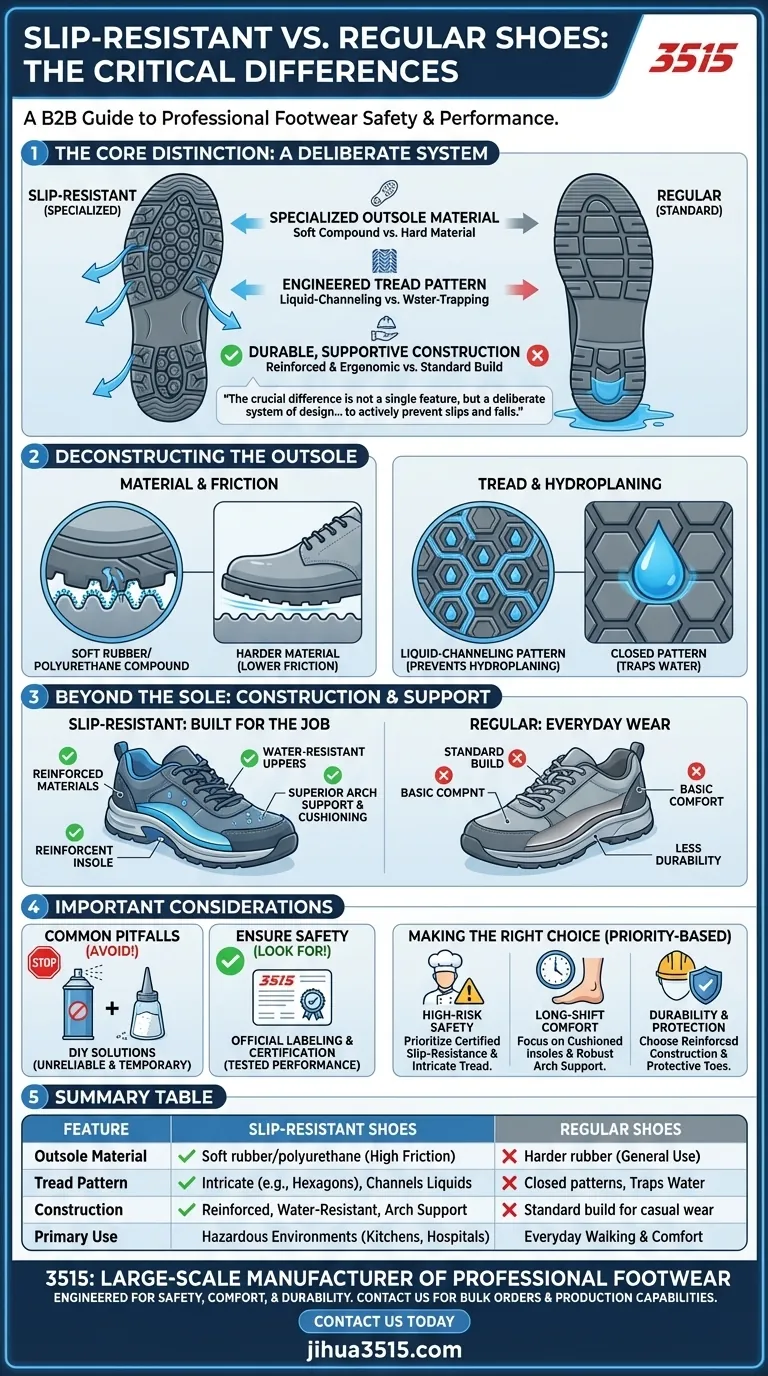
Related Products
- Safety Footwear Wholesale Manufacturer for Custom OEM/ODM Production
- Advanced KPU Athletic Safety Shoe with Steel Toe Cap Anti-Slip Rotary Lacing System
- Premium Suede Sport Safety Shoes for Wholesale & Bulk Orders
- Wholesale Premium Waterproof Nubuck Safety Shoes Boots
- Wholesale Durable Safety Boots | Custom Steel Toe & Puncture-Resistant Manufacturing
People Also Ask
- Do snake bite boots work? Your Ultimate Guide to Effective Snake Bite Protection
- What are the differences between steel toe, composite toe, and alloy toe Wellington boots? Choose the Right Safety Toe for Your Job
- How long can you wear safety boots? The Lifespan is Determined by Wear, Not Time
- What are OSHA approved shoes? Understanding the Correct Standards for Workplace Safety
- What do heavy duty boots do? Protect Your Feet in Demanding Work Environments

